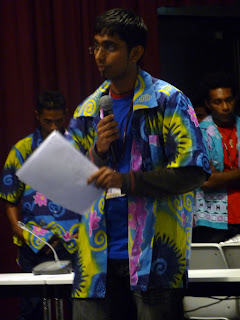On Monday as we walked into the main hall of the Bella Center we passed yet another person handing out sheets of paper. At the conference, you learn to keep your hands down or in your pockets to avoid being given countless documents you'll never look at again. Yet this particular woman mentioned something that sparked both the attention of both us and we took the paper. It was an announcement calling us to a side event in which eleven young people from Pacific nations were speaking. Being interested in the voices coming from both youth and vulnerable nations, we attended the event at 2 pm.
It began with an announcer who gave basic facts about Pacific nations. There are 8.6 million people living in the Pacific, and over 1000 languages are spoken there. Many Pacific nations are very close to sea level. The highest point in the Maldives is 4 meters above sea level, and on Kiribati it is just 3 meters.
One or two representatives from each of 9 countries spoke about specific issues their nation was facing. Almost all of the representatives talked about facing saltwater intrusion and therefore a freshwater shortage. This can be directly linked to a rising sea level, which comes from melting glaciers, a result of an increasing global temperature. Freshwater shortages lead to food security problems in many of these nations, and they can no longer profit from agriculture. Many of the nations also are hit with increasingly unpredictable weather patterns and storms, which also contributes to their inability to produce enough food.
During this session there were also many unique surprises. A few of the speakers performed a traditional dance, which was very neat to watch. We were also served coconut ice, which is a typical (very delicious) treat in many of the island nations. Towards the end, two of the speakers performed fabulous poems they had written. One particularly poignant line by the young woman from the Caribbean islands read, "that money you make, it's killing our children."
One of the issues that Deon has been focusing her research on at the conference is equality, so this session was especially meaningful to her. Jessica has been focusing some of her research on the Alliance of Small Island States, so it was a natural interest for her as well. These small Pacific nations are begging the developed countries to help them. They are emitting very little carbon themselves, yet they are being affected most strongly. The constant theme that everyone spoke about was his or her right to survive. They want their land, culture, people, and identity to survive. The young woman from the Maldives pleaded, "We are usually very happy people. Don't take our happiness away."
One country to look at is Papua New Guinea, which holds 5% of the world’s biodiversity. 75% of the country is covered in forests. 80% of the people rely on the forest for their livelihood; a local called it ‘the people’s supermarket’. Without this rich land and biodiversity, many of the people would suffer. In Papua New Guinea, the first of what may be many “climate change refugees” have already begun experiencing displacement issues. These refugees are people that have been forced to relocate because their village or home is no longer inhabitable. Forced migration, relocation and displacement are all problems the Pacific nations are faced with due to sever unpredictable weather, rising sea levels, coastal erosion and unreliable growing seasons.Tuvalu, another small island, has become increasingly more noticeable at the conference. The country’s negotiators have said that “it is an irony of the modern world that we are waiting for some senators in the U.S Congress to conclude their discussion before we can proceed”. Tuvalu and other small island nations are willing to do anything they can in order to reach a binding agreement at COP15 that will require all nations to cut their CO2 emissions and support technology transfer in developing nations. Reaching such a contract at this point is the one thing that all the small island nations are hoping for. This truly is the last thing the world can do to help suffering in the Pacific island.




2 comments:
Hello Deon and Jessica:
I enjoyed your comments on some of the smaller Pacific nations and their environmental and cultural issues.
While I would certainly support fiancial compensation from the UN for those communites who, because of climate change, have lost their livlihood, I wonder if that should be the highest priority.
My worry is that the focus on climate change in underdeveloped countries has now overshadowed their other more pressing needs like construction of schools, safe water wells, hospitals, and human rights issues, etc.
Even with environmental issues in underdeveloped countries, wouldn't it be smarter and more efficient to address those issues directly and immediately rather then to wait decades for the impact of the proposals from COP 15 to have an effect?
True, slowing down the rise in ocean levels will improve conditions for certain natural habitats, but wouldn't those habitats be preserved more efficiently and effectively by focusing (with financial resouces) on them right now.
Thanks much,
See you next week.
Nathan Nelson, Northfield, Minnesota
Mr. Nelson,
Thank you for your input!
One of the most commonly discussed methods for helping these small island states is funds for adaption. It’s true that waiting for the impact of long-term mitigation proposals will only prolong the problems that Pacific people currently face. Therefore, financially and educationally helping these people to develop technologies that will help them adapt is important. Unfortunately, no matter what the future of climate change policy brings, it is unreasonable to expect that the small island states will not see any negative effects of climate change. Even now, many islands are already combating harmful enough issues to drive relocation. However, if the people can adapt to these changes by modifying, for instance, the ways they produce food, or the types of homes they live in, we can hopefully limit the number of people who will be forced to leave.
The other issues you mentioned are indeed very important. However, I think that if people are thirsty because they have a shortage of freshwater due to the rising ocean levels, they will not want to focus on building a school. The best way for us to assist the small island states is to help them adapt right now. Before these nations can focus on development, I believe they need to feel confident that they can cope with the new climate changes.
-Deon
Post a Comment